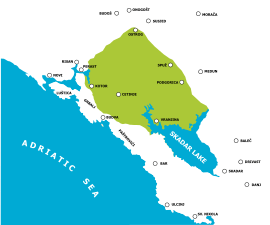Upper Zeta
Upper Zeta (Serbian: Горња Зета / Gornja Zeta) is a historical region in modern Montenegro, centered around the Zeta Plain, named after the Zeta river. During the Middle Ages, the province of Upper Zeta was part of the Serbian state under the Nemanjić dynasty, existing alongside Lower Zeta. It was then held by the Balšić and Crnojević noble families until the Ottoman conquest (1496). In the early modern period, the term was used for an area in the northern half of the "Old Montenegro" region, though its borders fluctuated.

Term
Upper and Lower Zeta were mentioned in medieval documents. Lower Zeta included the maritime belt from the Luštica bay and Grbalj to the Bojana river, while Upper Zeta spanned over a branch of the Lovćen mountain below Kotor to the eastern banks of the Skadar Lake and Zeta river.[1] Mentioning of Upper and Lower Zeta in the 15th and 16th century are scarce. Reliable documents show that up until the end of the 15th century, the term Zeta was simply used encompassing Pješivci, Malonšići, Očinići, Lopate and Bjelice.[1]
History
During the 15th century, regions of Upper and Lower Zeta had somewhat different histories. As a maritime region, Lower Zeta was exposed to expansion of the Venetian Republic, while mountainous regions of Upper Zeta remained under control of local lords. At the end of September 1441, duke Stefan Vukčić Kosača captured the territory of Upper Zeta on the left bank of Morača river.[2] Stefan Crnojević, who represented the whole Crnojević family, joined him in this campaign and was awarded by Kosača with control over five villages. He kept two of them (Goričane and Kruse) under his control and gave the other three to his brothers.[3] After the disappearance of Stefan's brother Gojčin from political life in 1451, Stefan became the ruler of a large part of Upper Zeta, strengthening his position by recognizing the authority of the Republic of Venice, entitled as duke of Upper Zeta (after 1452).[4] The reasons of the alliance are related to his anticipation of the downfall of the Serbian Despot. Venetian doge Francesco Foscari wrote a letter to Stefan in 1455 asking him to return to Budva its territory he captured.[5] In 1455 the Ottomans invaded Serbia and conquered all of its territories south of the Western Morava river, completely cutting Zeta off from the core of the Despotate. Therefore, Stefan Crnojević along with representatives of Upper Zeta signed an agreement that same year with the Venetians in Vranjina, by which Upper Zeta accepted Venetian supreme rule. Venice came to rule only the cities, while all internal affairs were left to duke Stefan. Venice also bound itself not to mettle with the ecclesiastical authority of the Orthodox Metropolitanate.
See also
References
- Станојевић 1975, p. 7.
- Ćirković 2004, p. 104.
- Божић 1970, p. 196
У другој половини септембра 1441. год. Стефан Вукчић је провалио у Горњу Зету и најприје заузео крајеве до Мораче. Придобио је Стефаницу Црнојевића, који је још био у слози с браћом и иступао у име читаве породице. Зато му је на освојеномподручју уступио пет катуна... Стефашца је по један катун уступио сваком брату, а сам задржао Горичане и Крусе
- Ćirković 2004, p. 107.
- Ivan Pederin (1990). Mletačka uprava, privreda i politika u Dalmaciji: 1409-1797. Časopis "Dubrovnik". p. 8. Retrieved 25 April 2013.
Sources
- Божић, Иван (1970). "Зета у Деспотовини". Историја Црне Горе (PDF). књ. 2, св. 2. Титоград: Редакција за историју Црне Горе. pp. 135–275.CS1 maint: ref=harv (link)
- Божић, Иван (1979). Немирно Поморје XV века. Београд: Српска књижевна задруга.CS1 maint: ref=harv (link)
- Ćirković, Sima (2004). The Serbs. Malden: Blackwell Publishing.CS1 maint: ref=harv (link)
- Fine, John Van Antwerp Jr. (1994) [1987]. The Late Medieval Balkans: A Critical Survey from the Late Twelfth Century to the Ottoman Conquest. Ann Arbor, Michigan: University of Michigan Press.CS1 maint: ref=harv (link)
- Станојевић, Глигор (1975). "Црна Гора у XVI вијеку". Историја Црне Горе (PDF). књ. 3, св. 1. Титоград: Редакција за историју Црне Горе. pp. 1–88.CS1 maint: ref=harv (link)